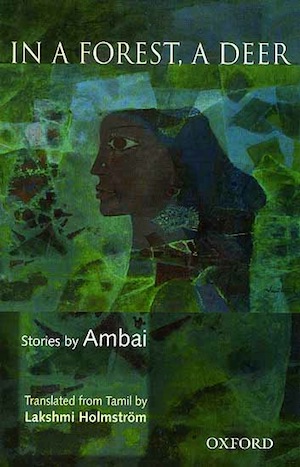I came across Ambai during my days of cinema research, as C S Lakshmi, a researcher and academician in women’s studies. For long after, I did not know Lakshmi write fiction and I didn’t bother. Recently, I got an opportunity to return to cinema research and I came across Lakshmi again and this time as Ambai. In an impulse, I decided to buy a collection of her short stories In a forest, a deer (Kaattil Oru Maan – translated from Tamil by Lakshmi Holmstrom). The short story collection is translated from Ambai’s work for various journals over a decade.
My personal journey through the book was that of a silent walk along the lives of the characters, carefully invisible so as not to disturb them but watch them closely because each character was one of us. Ambai, as the storyteller, seemed to be around me, holding my hand, walking me across.
In the first story – ‘Journey 1’, she deals with marriage and motherhood. The ironic and repeated use of the word ‘amma’ in casual conversation about motherhood playfully reflects on the ways we respect our women, and the reasons we choose to do so. The story titled ‘One and Another’ is perhaps the most intriguing of them all for me. Ambai writes about (what I understand) as two lovers – two men in love, devoid of inhibitions, living lives in the middle of art and activism, in a far away mountain village. There is hardly a direct mention of love or sex, but Ambai takes us through their lives leaving us to make what we want of it. But that’s hardly the story. The story here is of death, of not living without the one you love, of dying like a bird.
How do you wish to die?
Like a bird. With no one observing me. Without being nursed. Suddenly. Without any plan. With no one to remember me.
When he does die like that in the end, as a reader, someone standing by his shoulder watching him jump off a cliff, I didn’t have the urge to stop him. I had the urge to look away and forget him. That’s what he would have wanted.
‘Direction’ is another of my favourites. For instance, at a meeting to arrive at a few decisions after a peace march:
‘The rubbish bins ought to be kept clean’. Instantly someone added, ‘Women should come forward and take responsibility in this matter’. She retorted somewhat hotly that since there was neither male or female in the matter of rubbish, everyone should take responsibility in keeping the place clean. The man proclaimed loudly, ‘Oh, a feminist! A feminist in our midst!’ Then he added dramatically, ‘Please forgive me madam.’ Everyone laughed at this.
And then there is a story about rain, ‘glow’ it is called. Which begins with squirrels and ends with Bharati. ‘Parasakthi and others in a plastic box’ – a story of displacement and compassion. The aged mother who makes pickles for the neighbourhood and distributes kungumappoo to pregnant women around. A simple Tamil woman who brought up two modern young women. ‘Vaaganam‘ is the story of a woman’s dream to cycle – a metaphor for the degradation of a woman’s freedom post independence.
In a forest, a deer – a woman who hasn’t come of age, unpublished manuscript – a woman who left the home of her abusive husband (who she chose herself), Wrestling – a woman who has to give up public performance because she is better than her husband, Journey 3 – of women, children, gods and movies, Ambai tells tales from real life. Of people you know, of women you’ve seen, of situations you’ve witnessed, of tears you’ve shed.
‘Forest’ is an enthralling story, perhaps more than one story. The story of Chenthiru who goes to the forest looking for peace and of Sita who gets her rudravinai lessons from Ravana. Of independent life in the forest, of wandering and thinking, of peacocks and rains, of toddy-drinking rural women, of Sitayanam, of lifting Shiva’s bow as a child but waiting to marry the man who can lift it, of falling in love but staying within boundaries, of being betrayed, of walking away and starting afresh. In all of her stories, Ambai draws from mythology, from culture, from history – but this one is the most moving retelling of them all. Of leaving Sita alone, allowing her to redeem herself. Of dwelling in possibilities.
It is my life, isn’t it? A life that many hands have tossed about, like a ball. Now, let me take hold of it; take it into my hands.
Every story is a gem. Every woman is a silent warrior. Every feminism is new.
Image courtesy of womensweb.in

Leave a Reply